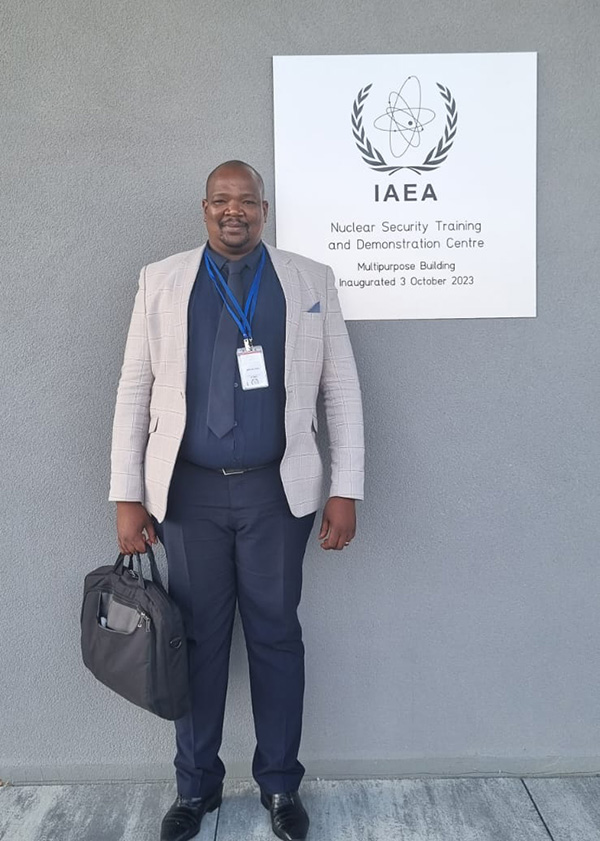-NWU and IAEA collaborate to train students in nuclear forensic science
-The partnership will develop a Nuclear Crime Scene Management Laboratory
-The IAEA has recommended that each of its member states establish a national nuclear forensic library
In a significant step toward enhancing nuclear forensic science capabilities, the North-West University (NWU) and the International Atomic Energy Agency (IAEA) have entered into a ground-breaking partnership.
This collaboration focuses on training students in nuclear forensic science, with the objective of bringing the radiological crime scene to the nuclear forensics laboratory.
As part of this initiative, the partners are committed to developing a nuclear forensics and nuclear crime scene management laboratory in the NWU's Centre for Applied Radiation Science and Technology in Mahikeng. The laboratory will serve as a vital hub for research, training, and investigation in the field of nuclear forensics.
Leading the charge as the chief scientific investigator is field expert Dr Tebogo Kupi. Dr Kupi's extensive experience and knowledge will be instrumental in steering the research project towards its objectives.
The research project encompasses a range of critical activities aimed at advancing nuclear forensic science and ensuring the effective management of radiological crime scenes. Some of the key tasks to be undertaken include:
· Development of detection and handling procedures: A dedicated research team will focus on the development of comprehensive procedures for the detection, handling, storing and transportation of radioactive and nuclear materials. This includes the utilisation of advanced radiation detection instruments such as RadEye, Electra, and Inspector 200.
· Categorisation and characterisation of materials: The team will also work on procedures for the categorisation and characterisation of radioactive and nuclear materials. These processes will make use of sophisticated techniques such as inductively coupled plasma mass spectrometry and gamma spectrometry. Furthermore, the team will develop separation method procedures for materials like uranium, lead, and rare-earth elements.
· Teaching material development: Ensuring the knowledge and expertise gained through the research are passed on, a dedicated research team will be tasked with developing teaching materials. These materials will focus on the detection, handling, storing and transport of radioactive and nuclear materials. They will be instrumental in the training of staff and students interested in the field of nuclear forensic science.
“The IAEA has recommended that each of its member states establish a national register of nuclear material and radioactive sources known as the National Nuclear Forensic Libraries,” adds Dr Kupi.
“This will enable the member states to ensure accountability for all nuclear material under their control, and the output of this work can be added to a national nuclear forensics library for reference purposes. Since South Africa is embarking on developing and establishing a national nuclear forensic library, this work supports and strengthens these initiatives. Furthermore, the National Nuclear Forensic Libraries offers a credible assessment of whether nuclear and other radioactive material encountered outside of the regulatory authority is consistent with material produced, used or stored within the state,” says Dr Kupi.
In a recent significant development, Dr Kupi participated in the IAEA preparatory meeting for the Integrated Workshop on Radiological Crime Scene Management and Nuclear Forensics. The event took place at the Nuclear Security Training and Demonstration Centre in Seibersdorf, Austria, from 9 to 13 October.
The primary purpose of this gathering was to conduct a “dry run” for the Integrated Workshop on Radiological Crime Scene Management and Nuclear Forensics, which is scheduled to be piloted in April 2024 at the Nuclear Security Training and Demonstration Centre in Seibersdorf.
The partnership between the NWU and the IAEA reflects a shared commitment to enhancing nuclear forensic science capabilities, ultimately contributing to global security. The establishment of a dedicated Nuclear Forensics and Nuclear Crime Scene Management Laboratory is expected to be a significant leap forward in terms of research and training opportunities in this specialised field.

Dr Tebogo Kupi.
